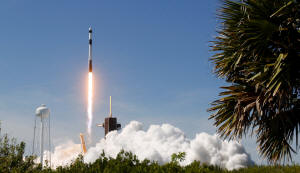First all-private astronaut team aboard space station heads for
splashdown
 Send a link to a friend
Send a link to a friend
 [April 25, 2022]
By Steve Gorman [April 25, 2022]
By Steve Gorman
(Reuters) - The first all-private astronaut
crew to fly aboard the International Space Station (ISS) headed for
splashdown Monday off the coast of Florida, wrapping up a two-week
mission that NASA has touted as a landmark in commercial spaceflight.
A SpaceX Crew Dragon capsule carrying the four-man team of Houston-based
startup Axiom Space Inc began its return flight about 9 p.m. EDT Sunday
(0100 Monday GMT) as it undocked from the space station orbiting about
250 miles (420 km) above Earth.
The Crew Dragon was expected to parachute into the Atlantic around 1
p.m. EDT on Monday (1700 GMT), capping a 16-hour ride home from orbit
that had been postponed for several days because of unfavorable weather.
The multinational Axiom team was led by Spanish-born retired NASA
astronaut Michael Lopez-Alegria, 63, the company's vice president for
business development. His second-in-command was Larry Connor, 72, a
technology entrepreneur and aerobatics aviator from Ohio designated the
mission pilot.
Joining them as "mission specialists" were investor-philanthropist and
former Israeli fighter pilot Eytan Stibbe, 64, and Canadian businessman
and philanthropist Mark Pathy, 52.

Launched from NASA's Kennedy Space Center on April 8, they spent 15 days
aboard the space station with the seven regular, government-paid ISS
crew members: three American astronauts, a German astronaut and three
Russian cosmonauts.
The ISS has hosted several wealthy space tourists from time to time over
the years.
But the Axiom quartet was the first all-commercial team ever welcomed to
the space station as working astronauts, bringing with them 25 science
and biomedical experiments to conduct in orbit. The package included
research on brain health, cardiac stem cells, cancer and aging, as well
as a technology demonstration to produce optics using the surface
tension of fluids in microgravity.
[to top of second column]
|

Axiom's four-man team lifts off, riding atop a SpaceX Falcon 9
rocket in the first private astronaut mission to the International
Space Station, from NASA's Kennedy Space Center in Cape Canaveral,
Florida, U.S. April 8, 2022. REUTERS/Steve Nesius
 Axiom, NASA and SpaceX have hailed
the mission as a milestone in the expansion of privately funded
space-based commerce, constituting what industry insiders call the
"low-Earth orbit economy," or "LEO economy" for short.
It was the sixth human spaceflight for SpaceX in nearly two years,
following four NASA astronaut missions to the ISS and the
"Inspiration 4" flight in September that sent an all-private crew
into Earth orbit for the first time, though not to the space
station.
SpaceX, the private rocket company founded by Tesla Inc electric
carmaker CEO Elon Musk, has been hired to fly three more Axiom
astronaut missions to ISS over the next two years. The price tag for
such outings is high.
Axiom charges customers $50 million to $60 million per seat,
according to Mo Islam, head of research for the investment firm
Republic Capital, which holds stakes in both Axiom and SpaceX.
Axiom also was selected by NASA in 2020 to build a new commercial
addition to the space station, which a U.S.-Russian-led consortium
of 15 countries has operated for more than two decades. Plans call
for the Axiom segment to eventually replace the ISS when the rest of
the station is retired around 2030.
(Reporting by Steve Gorman in Los Angeles. Editing by Gerry Doyle)
[© 2022 Thomson Reuters. All rights
reserved.] This
material may not be published, broadcast, rewritten or
redistributed.
Thompson Reuters is solely responsible for this content.
 |